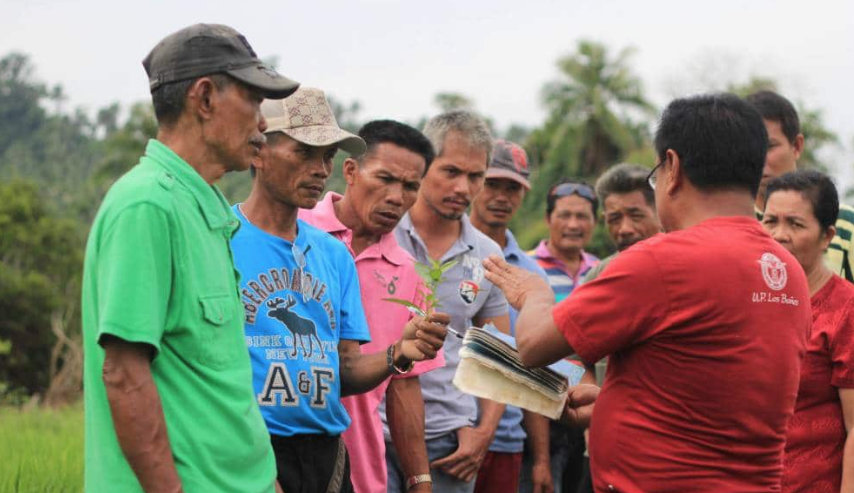
Philippine agriculture is taking a hit from multiple fronts in the midst of the war waged by Russia in Ukraine.
One of these is the shortage of and skyrocketing prices of fertilizers caused by the increase in oil prices and because 40 percent of the global requirement of fertilizers comes from the two countries and from a third, Belarus, which has stopped supplying fertilizers to the rest of the world.
The prices of chemical fertilizers in the country have more than doubled since last year and University of the Philippines Los Baños (UPLB) has reminded the agriculture sector of the whole range of biofertilizers that its National Institute of Molecular Biology and Biotechnology (Biotech) has developed and promoted over the years.
These fertilizers will greatly help the agriculture sector in this time of dire need for the commodity.
Bio N biofertilizer for rice, corn, vegetables
One of these is the microbial-based Bio N biofertilizer that Dr. Mercedes Umali-Garcia of UPLB-Biotech developed almost 40 years ago.
Bio N has been helping rice, corn, and vegetable farmers increase their yield while maintaining soil health.
A microbial inoculant, Bio N converts atmospheric nitrogen into a form that plants can easily use. It contains nitrogen-fixing bacteria Azospirillum carried in soil and charcoal.
It improves the plant’s root system, boosts nutrient absorption, provides resistance to pests and diseases, and enhances soil conditions.
Bio N users report an improvement in grain quality and an increase in yield. Using Bio N also cuts production costs.
A farmer-vegetable dealer from Isabela, Ricky Mabunga, talked about how he was able to save on the cost of inputs when he began using Bio N.
In a recent interview, Mabunga said replacing two sacks of urea (50 percent of the average recommendation per hectare) that cost P5,200 with the recommended five to six sachets of Bio N per hectare that cost P500-600 translates to more than P4,500 in savings.
Diffusion of Bio N
Bio N is currently produced in both concentrated form and ready-to-use packs at Biotech. It is also manufactured and distributed by 17 mixing plants established all over the country by UPLB and the Department of Agriculture in 2004 as part of the Corn Development Program of the National Food Authority and GMA Corn Program.
The establishment of the mixing plants aimed to produce Bio N in areas that are accessible to the farmers as part of the national thrust to improve rice and corn productivity, generate income and employment, and transform marginal areas into self-sufficient farming communities.
The operating personnel of the Bio N mixing plants was trained by the Biotech team, led by University Researcher and Bio N project leader Julieta A. Anarna.
In May, Biotech supplied 1,000 Bio N concentrates (good for 20,000 ready-to-use Bio N packets) to the Ilagan Soils Laboratory Regional Field Office II which established and operates the Bio N mixing plant in Ilagan, Isabela.
Expanding to more avenues for distribution and R&D
The UPLB continues to find avenues to ensure that the biofertilizer reaches Filipino farmers.
On May 23, UPLB signed a memorandum of agreement (MOA) with DA Regional Field Office III for the supply and delivery of 10,000 packs of Bio N for Region III.
Also being pursued by the University is continuous research and development (R&D) on biofertilizers. UPLB, through Biotech, entered a mMemorandum of understanding (MOU) with DA last March 22.
The MOU titled, “Continuing Biotechnology Inputs to Support the Intensified National Food Production Programs,” stipulates areas of collaboration in R&D, capacity building, and upscaling of Bio N and other Biotech biofertilizers and technologies.
The Institute continued its dialogue with key stakeholders for the enhanced production and distribution of Bio N in a meeting held on May 10 with Dr. Leocadio S. Sebastian, DA undersecretary and chief of staff; Dr. Emil Q. Javier, National Scientist and Biotech founding director; Dr. John C. De Leon, executive director of the Philippine Rice Research Institute; and members of the private sector.
Bio N project leader Anarna attributes the success of Bio N’s diffusion to government support and the dedication of personnel in the production and dissemination of the biofertilizer.














